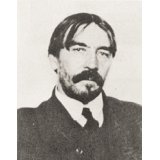The Theory of Business Enterprises Part 7: Cultural Changes
In the early chapters of the book, Thorstein Veblen describes industrial productive methods and the changes they require of workers. In Chapter 9, he describes the effect of those changes on the workers and on businessmen who own the factories. In general, the businessmen become more attached to a system of thought based on natural rights. Natural rights law, especially as related to ownership and property, is the basis for their control of the productive sector; and it gives them the tools they use to continue that domination. Natural rights ideas were formulated in a much earlier era, when the dominant mode of production was the individual fabricator, the individual handicraft worker. Natural law was embedded in the entire social fabric, Church, State, and community. These institutions remained strong in the early part of the industrial age, up to 1904 when Veblen wrote.
Veblen says that factory workers were moving away from the natural law ideas, which, after all, were a metaphysical formulation, grounded in the social structures of an earlier day and an earlier system of production. Their lives were now ruled by gauges and measurements, by cause and effect. This is the form of inquiry behind the development of the sciences which drove the technology of the machine age. It tends to undercut the traditional forms of thought that underlie the conventional thinking of the businessmen, forms which Veblen calls metaphysical.
Veblen says that this newer kind of thinking led the working classes to lose respect the natural rights forms of thinking, and specifically for property rights and the individual ownership of industrial property. In turn, this helped the working class to see itself differently, as expressed in the trade union movement, and in socialist and even anarchist thinking. For the most part, he thought that the trade union movement would reinforce the business interests by making only those demands necessitated by the changes that the industrial process made in the lives of the workers. They sought standardized wages and regular hours and other accommodations necessary to make their lives more pleasant, and did not carry the ideas of cause and effect or the indifference to property rights to their logical extreme as socialist theory would. He adds a long and unfriendly discussion of socialism.
When he gets back to the cultural changes, one of the issues he identifies is changes in domestic relations. The traditional family becomes a less spiritually important institution.
What appears to be in jeopardy, should the socialistic defection gain ground, is the headship of the male in the household economy. The family, as it has come down from the medieval past, under the shelter of the church, is of a patriarchal constitution, at least in theory. The man has been vested with discretionary control in domestic affairs.
As the discussion continues, it becomes apparent that the driving force isn’t socialist theory, but real changes in the possible ways to live created by the machine age. It isn’t just the family, it’s the Church, and even patriotism that are called into question. Mere formal or conventional justifications do not suffice for people of any class whose thought processes are governed by theories grounded in cause and effect.
The machine technology is a mechanical or material process, and requires the attention to be centred upon this process and the exigencies of the process. In such a process no one factor stands out as unequivocally the efficient cause in the case, whose personal character, so to speak, is transfused into the product, and to whose workings the rest of the complex of causes are related only as subsidiary or conditioning circumstances. … The process is always complex; always a delicately balanced interplay of forces that work blindly, insensibly, heedlessly; in which any appreciable deviation may forthwith count in a cumulative manner, the further consequences of which stand in no organic relation to the purpose for which the process has been set going. The prime efficient cause falls, relatively, into the background and yields precedence to the process as the point of technological interest.
Veblen said that this was happening to the greatest extent in the large industrial towns, and less so in the smaller towns and the countryside. Veblen is obviously interested in the culture of the workers; he ignores the conventional thinking of the businessman, and focuses on cultural changes in the vastly larger class of working people. Veblen thought that cultural growth in the machine age would be “… of a skeptical, matter-of-fact complexion, materialistic, unmoral, unpatriotic, undevout.”
In Chapter 10, Veblen takes up the future of the businesses. He thinks they will collapse because they become “fiscal ways and means”, subservient to a militaristic state which itself will collapse under the pressures of war. That didn’t happen.
As it turned out Veblen was more or less right that there were changes in the working classes in the larger industrial towns, and less so in the rest of the country. He ignored the Grange Movement and a good bit of the populist revolution on the farms, though. Even so, that was enough change to produce the New Deal and a highly efficient war machine in WWII, and a strong working class throughout the 50s and early 60s. By that time, socialism was wiped out in the US, and the union movement began to deteriorate. The war industry picked up strength first under Kennedy and LBJ, and then at higher levels beginning with Reagan, the second of his predictions began to seem more plausible. But it won’t be counteracted by an organized and strong working class, because there isn’t one.
We seem to be lurching from one crisis created by the elites to the next crisis created by the elites. We could use some ballast.

